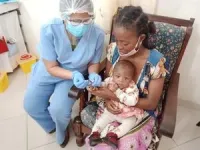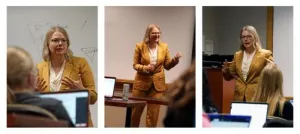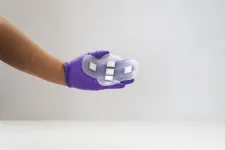(Press-News.org) TAMPA, Fla. (Nov. 16, 2023) -- A team of engineers and public health experts from the University of South Florida is helping Toamasina, Madagascar, residents reduce their exposure to lead – a major global environmental pollutant that causes more than 1 million premature deaths each year. By combining efforts to replace water pumps and educate city technicians, USF researchers helped decrease the blood lead levels of 87 percent of the children tested during their study.
“They were taking old car batteries and melting them down to make check valves in the pumps,” said James Mihelcic, professor and director of USF’s International Development Engineering Program.
Mihelcic made the discovery when visiting the East African country with students to study Toamasina’s water and sanitation. “We brought back water samples to USF to test them and we learned the locally manufactured pumps had really high levels of lead.”
The lead concentrations of the water from the pumps exceeded the World Health Organization’s recommended limit of lead in drinking water – 10 micrograms per liter. In some cases, the water contained more than 10 times the recommended limit.
“The families and children are drinking this water and using it to cook their meals,” said principal author Adaline Buerck, a USF civil and environmental engineering doctoral alumna. “In low- and middle-income countries, there is a lack of regulations and understandings of the harmful effects of lead, as well as other comorbidities, such as improper nutrition, that can increase childhood lead absorption.”
The pumps are the primary source of water for more than three-quarters of the coastal area of Madagascar, where there are about 9,000 pumps because tap water is not always affordable or available for the city’s 280,000 people. After receiving a small grant to replace lead components in 500 of the pumps, Mihelcic and Buerck knew it would be a challenge to remediate all of the remaining pumps. They decided to collaborate with Mahmooda Khaliq Pasha, USF associate professor of public health and social marketing.
Khaliq Pasha used social marketing – a process that focuses on changing behavior to improve health using strategies from the commercial marketing world – to create a faster, more cost-effective plan to directly educate the people responsible for the manufacturing and repairing of the pumps.
“We knew we couldn’t replace all of the pumps, so we provided training to the technicians about the dangers of lead and why they could have an improved product if they make a lead-free pump,” Khaliq Pasha said. “Now, when they manufacture a new pump or repair existing ones, they will use these new strategies, and with that, we're impacting the larger population rather than just the small sample that we work with.”
Khaliq Pasha and Buerck worked with local staff to build the capacity and skill set of technicians, while overseeing and facilitating work on the pumps to ensure they understood how to remove and replace the leaded pump components. Additionally, to understand the impact of this intervention, they worked with local health practitioners to measure blood lead levels of small children who drank water from the pumps before and after the leaded pump components were replaced.
Of the 55 children tested, 87 percent experienced a significant decrease in blood lead levels once leaded components were removed from the pumps. For example, one child had an initial 11.3 micrograms of lead per liter of blood. Following the intervention, that level dropped to 4.7 micrograms per liter. The team believes these findings point to a need for greater consideration of lead in drinking and cooking water as an important exposure route in low- and middle-income countries.
“This study really puts into perspective the social aspects of public health,” Buerck said. “For me, it really linked engineering to the real world and the impact you can have.”
Through a National Science Foundation grant, USF students are working with Khaliq Pasha, Mihelcic and USF Associate Professor Jeff Cunningham to continue visiting Madagascar. They will work with families to further purify their water by removing disease-causing pathogens. Khaliq Pasha and Mihelcic hope to secure additional funding to continue working with the technicians and scale the work to impact the larger population.
END
USF researchers help reduce lead levels in Madagascar drinking water
Combined efforts of engineers, public health experts reduce blood lead levels in 87 percent of children
2023-11-16
ELSE PRESS RELEASES FROM THIS DATE:
UofL law professor developing generative AI toolkit to aid legal writing instruction
2023-11-16
LOUISVILLE, Ky. – While many are wary of artificial intelligence and its feared effect of supplanting the human creation of content, one University of Louisville professor is leading an effort to help her colleagues use it in the classroom.
Susan Tanner, assistant professor of law at UofL’s Brandeis Law School, has won a teaching grant from the Association of Legal Writing Directors to develop a toolkit that law professors anywhere can use to incorporate generative artificial intelligence (genAI) into their legal writing curricula.
GenAI is technology that can create text, images, videos and other media in response to prompts inputted by a user – otherwise known ...
Novel predictor of prediabetes in Latino youth identified in new USC study
2023-11-16
A team of researchers from the Keck School of Medicine of USC have identified two metabolites, substances produced by the body during metabolism, that may help predict which young Latino people are most likely to develop prediabetes, a precursor to developing type 2 diabetes.
The study, funded by the National Institutes of Health and published in Diabetes Care, is the first large-scale study to look at metabolites as possible predictors of prediabetes or type 2 diabetes in young Latino people. The researchers found that when they added these two metabolites to current prediction models, they could more accurately ...
More than 1 in 10 pediatric ambulance runs are for mental health emergencies
2023-11-16
A new study offers a novel look at the scope of the youth mental health crisis across the United States – in 2019-2020, more than 1 in 10 kids who were brought to the hospital by ambulance had a behavioral health emergency. Out of these behavioral health emergencies, 85 percent were in 12-17-year-olds. Findings were published in the journal Academic Emergency Medicine.
“Our study found that pediatric behavioral health emergencies requiring an ambulance were much too frequent,” said senior author Jennifer Hoffmann, MD, MS, emergency ...
Sunny Jardine appointed new Editor-in-Chief of Marine Resource Economics
2023-11-16
Marine Resource Economics (MRE) is proud to announce the appointment of Sunny Jardine as the journal’s new Editor in Chief, effective January 8, 2024. Jardine is an associate professor and the Rae S. and Bell M. Shimada Endowed Faculty Fellow in Memory of Warren S. Wooster in the School of Marine and Environmental Affairs at the University of Washington.
Professor Jardine has supported MRE as a long-time associate editor. In that capacity, she handled papers across a range of marine and resource economics applications. She brings expertise in commercial fisheries management, conservation planning, the ...
Mayo Clinic and Columbia University receive $10.6 million grant from NCI to advance glioblastoma research with mathematical oncology
2023-11-16
Mayo Clinic Comprehensive Cancer Center and Columbia University received a five-year, $10.6 million U54 center grant from the National Cancer Institute (NCI) to further study combining the molecular analysis of glioblastoma with MRI.
Glioblastoma is a fast-growing and aggressive brain tumor that begins as a growth of cells in the brain or spinal cord. As it grows, it can invade and destroy healthy tissue. There is no cure, but treatments may slow the cancer's growth and reduce symptoms.
Glioblastoma is a diverse cancer, which means ...
A new ultrasound patch can measure how full your bladder is
2023-11-16
CAMBRIDGE, MA -- MIT researchers have designed a wearable ultrasound monitor, in the form of a patch, that can image organs within the body without the need for an ultrasound operator or application of gel.
In a new study, the researchers showed that their patch can accurately image the bladder and determine how full it is. This could help patients with bladder or kidney disorders more easily track whether these organs are functioning properly, the researchers say.
This approach could also be adapted to monitor other organs within the body by changing the location of the ultrasound array and tuning the frequency ...
Cognitive and emotional well-being of preschool children before and during the pandemic
2023-11-16
About The Study: Pandemic-exposed children (assessment after March 11, 2020) had significantly higher problem solving and fine motor skills at 24 months of age but lower personal-social skills compared with non-exposed children in this study including data from the Ontario Birth Study. At 54 months of age, pandemic-exposed children had significantly higher vocabulary, visual memory, and overall cognitive performance compared with non-exposed children.
Authors: Mark Wade, Ph.D., C.Psych., of the University of Toronto, is the corresponding author.
To access the embargoed study: Visit our For The Media website ...
Social determinants of health and perceived barriers to care in diabetic retinopathy screening
2023-11-16
About The Study: This study of 11,000 participants with type 2 diabetes found that food insecurity, housing insecurity, mental health concerns, and the perceived importance of practitioner concordance were associated with a lower likelihood of receiving eye care. Such findings highlight the self-reported barriers to seeking care and the importance of taking steps to promote health equity.
Authors: Sophia Y. Wang, M.D., M.S., of Stanford University in Palo Alto, California, is the corresponding author.
To access the embargoed study: Visit our For The Media website at this link https://media.jamanetwork.com/
(doi:10.1001/jamaophthalmol.2023.5287)
Editor’s ...
Pushing the boundaries of eco-friendly chemical production
2023-11-16
A team of pioneering researchers from the Center for Advanced Bioenergy and Bioproducts Innovation (CABBI) has made a significant leap forward in the complex world of molecular chemistry.
Their focus? Azaarenes, unique molecular puzzle pieces crucial to many everyday products, from eco-friendly agrochemicals to essential medicines. The CABBI team demonstrated an innovative way to modify these molecules, a groundbreaking discovery that holds promise for new industrially relevant chemical reactions and sustainable energy solutions.
Central to their ...
Hospitals serving large Black, Hispanic populations have fewer resources for cancer care
2023-11-16
Key takeaways
UCLA researchers looked at nearly 4,400 hospitals across the U.S., including 864 with high numbers of Black and Hispanic patients.
Hospitals serving Black, Hispanic and other racial and ethnic minority patients were significantly less likely than other hospitals to have access to core cancer services like PET/CT scanners, robotic surgery and palliative care.
The researchers say further work is need to understand how geographic, linguistic, cultural, cost and discrimination factors affect these cancer care disparities.
Among the nation’s ...
LAST 30 PRESS RELEASES:
Yale study challenges notion that aging means decline, finds many older adults improve over time
Korean researchers enable early detection of brain disorders with a single drop of saliva!
Swipe right, but safer
Duke-NUS scientists identify more effective way to detect poultry viruses in live markets
Low-intensity treadmill exercise preconditioning mitigates post-stroke injury in mouse models
How moss helped solve a grave-robbing mystery
How much sleep do teens get? Six-seven hours.
Patients regain weight rapidly after stopping weight loss drugs – but still keep off a quarter of weight lost
GLP-1 diabetes drugs linked to reduced risk of addiction and substance-related death
Councils face industry legal threats for campaigns warning against wood burning stoves
GLP-1 medications get at the heart of addiction: study
Global trauma study highlights shared learning as interest in whole blood resurges
Almost a third of Gen Z men agree a wife should obey her husband
Trapping light on thermal photodetectors shatters speed records
New review highlights the future of tubular solid oxide fuel cells for clean energy systems
Pig farm ammonia pollution may indirectly accelerate climate warming, new study finds
Modified biochar helps compost retain nitrogen and build richer soil organic matter
First gene regulation clinical trials for epilepsy show promising results
Life-changing drug identified for children with rare epilepsy
Husker researchers collaborate to explore fear of spiders
Mayo Clinic researchers discover hidden brain map that may improve epilepsy care
NYCST announces Round 2 Awards for space technology projects
How the Dobbs decision and abortion restrictions changed where medical students apply to residency programs
Microwave frying can help lower oil content for healthier French fries
In MS, wearable sensors may help identify people at risk of worsening disability
Study: Football associated with nearly one in five brain injuries in youth sports
Machine-learning immune-system analysis study may hold clues to personalized medicine
A promising potential therapeutic strategy for Rett syndrome
How time changes impact public sentiment in the U.S.
Analysis of charred food in pot reveals that prehistoric Europeans had surprisingly complex cuisines
[Press-News.org] USF researchers help reduce lead levels in Madagascar drinking waterCombined efforts of engineers, public health experts reduce blood lead levels in 87 percent of children




